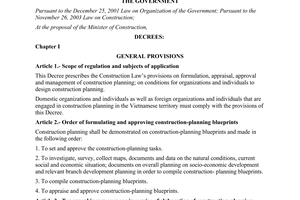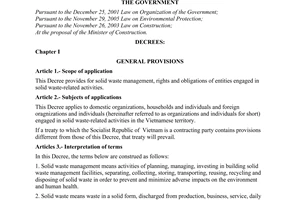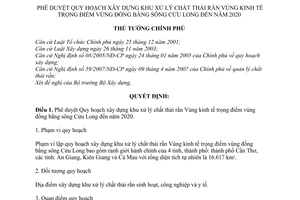Nội dung toàn văn Decision No. 1873/QD-TTg approving the plan on building solid waste treatment
|
THE PRIME MINISTER |
SOCIALIST
REPUBLIC OF VIET NAM |
|
No. 1873/QD-TTg |
Hanoi, October 11, 2010 |
DECISION
APPROVING THE PLAN ON BUILDING SOLID WASTE TREATMENT FACILITIES IN THE MEKONG RIVER DELTA KEY ECONOMIC REGION THROUGH 2020
THE PRIME MINISTER
Pursuant to the December 25, 2001 Law on Organization of the Government;
Pursuant to the November 26, 2003 Construction Law;
Pursuant to the Government's Decree No. 08/ 2005/ND-CP of January 24, 2005, on
construction planning;
Pursuant to the Government's Decree No. 59/ 2007/ND-CP of April 9, 2007, on the
management of solid waste;
At the proposal of the Minister of Construction,
DECIDES:
Article 1. To approve the Plan on building solid waste treatment facilities in the Mekong River delta key economic region through 2020.
1- Planning scope
The plan on building solid waste treatment facilities in the Mekong River delta key economic region encompasses the administrative boundaries of Can Tho city and An Giang, Kien Giang and Ca Mau provinces, with a total area of 16,617 km2.
2. Planning objects
Locations for building household, industrial and hospital solid waste treatment facilities.
3. Planning viewpoints
- To plan the building of solid waste treatment facilities in the Mekong River delta key economic region in conformity with socio-economic development orientations, the plan on building the Mekong River delta region through 2020. with 2050 vision, the national strategy on integrated management of solid waste through 2025. with 2050 vision, and other relevant regional and provincial specialized plans approved by competent authorities.
- To plan the building of inter-provincial solid waste treatment facilities for disposal of hazardous solid waste.
- To plan the building of solid waste treatment facilities in each province for disposal of ordinary household, industrial and hospital solid waste.
- To apply solid waste treatment technologies suitable to local practical conditions, prioritizing solid waste recycling and reusing technologies while minimizing waste burial so as to resolutely tackle environmental pollution and increase land use efficiency.
- To encourage all economic sectors to invest in building solid waste collection and treatment facilities and managing collection and treatment activities.
4. Planning objectives
- To determine appropriate locations and sizes of inter-provincial and provincial solid waste treatment facilities so as to attain the objective that by 2015 and 2020. 90% and 100% of solid waste generated in urban centers and industrial parks in the Mekong River delta key economic region will be collected and treated.
- To mobilize all social resources for solid waste management activities. To raise funds from various sources for investment in solid waste treatment facilities and solid waste management.
- To contribute to mitigating environmental pollution and assuring stable and sustainable socio-economic development in the region and all over the country.
5. Planning contents
a/ Forecasting the volume of solid waste generated
By 2015, the total volume of solid waste generated will be about 4,600 tons/day, including 4,260 tons of household solid waste, 300 tons of industrial solid waste and 40 tons of hospital solid waste.
By 2020, the total volume of solid waste generated will be about 7.550 tons/day, including 6.500 tons of household solid waste, 1,000 tons of industrial solid waste and 50 tons of hospital solid waste.
Total forecast volume of solid waste generated in provinces in the Mekong River delta key economic region:
|
No. |
Province/city |
Forecast volume of solid waste (tons/day) |
|
|
2015 |
2020 |
||
|
1 |
An Giang |
1,400 |
2,100 |
|
2 |
Kien Giang |
1,100 |
2,150 |
|
3 |
Can Tho |
1,100 |
1.900 |
|
4 |
Ca Mau |
1.000 |
1,400 |
|
|
Total |
4,600 |
7,550 |
b/ Solid waste treatment technologies
- Household solid waste treatment technologies:
The following solid waste treatment technologies will be applied in conformity with local practical conditions:
+ Hygienic burial: To be applied to dispose of mixed waste with negligible hazardous compositions in large areas.
+ Composting: To be applied in areas with small landfills and a large volume of organic solid waste;
+ Recycling: To be applied to dispose of garbage which, after being technically treated, remains usable.
+ Incineration: To be applied to dispose of flammable and hazardous garbage of a low moisture.
- Industrial and hospital solid waste treatment technologies:
In order to thoroughly dispose of industrial and hospital solid waste, especially hazardous waste, several technological processes must be combined as follows:
- Supportive technologies for the disposal of hazardous industrial waste, including sorting and mechanical or chemical-physical treatment.
- Technologies for disinfecting contaminated hospital solid waste.
- Incineration: To be applied to dispose of hazardous hospital solid waste and some kinds of hazardous industrial solid waste (organic waste).
- Hygienic burial: To be applied to dispose of ordinary industrial and hospital solid waste; other hazardous industrial solid waste and hardened ashes of hazardous hospital solid waste.
c/ Planning the building of solid waste treatment facilities in the Mekong River delta key economic region's provinces
- Inter-provincial solid waste treatment facilities
Under this Plan, a 20-hectare hazardous solid waste treatment facility will be built next to the solid waste treatment facility of Ca Mau province.
- Provincial solid waste treatment facilities
Under this Plan, 5 provincial solid waste treatment facilities will be built as follows:
|
No. |
Province/City |
Location |
Size |
Targeted objects |
|
1 |
An Giang |
Chau Thanh district |
About 50 hectares |
- Ordinary household, industrial and hospital solid waste of Long Xuyen city and part of Thoai Son and Chau Thanh districts |
|
2 |
Kien Giang |
Hon Dat district |
About 50 hectares |
- Ordinary household, industrial and hospital solid waste of Rach Gia city, Hon Dat district and adjacent areas |
|
3 |
Can Tho city |
0 Mon district |
About 47 hectares |
- Ordinary household, industrial and hospital solid waste of Can Tho city |
|
4 |
Can Tho city |
Thoi Lai district |
About 120 hectares |
- Ordinary household, industrial and hospital solid waste of Can Tho city-after 2020 |
|
5 |
CaMau |
Area about 20-30 km north of Ca Mau city |
About 100 hectares |
- Ordinary household, industrial and hospital solid waste of Ca Mau city, U Minh district and adjacent industrial parks from 2025. |
6. Investment phases
a/ The 2010-2015 period:
- To review and work out a roadmap for closing existing garbage landfills which fail to satisfy environmental requirements according to regulations.
- To review solid waste collection, sorting and treatment projects based on general orientations of the region.
- To review and modify provincial solid waste management plans or formulate new plans in conformity with this plan.
- To formulate projects on solid waste collection and sorting at source (lobe implemented mostly in provincial cities and towns) and, at the same time, carry out programs to mobilize community participation.
- To prepare grounds and formulate investment projects on building infrastructure in provincial and inter-provincial solid waste treatment facilities.
b/ The 2015-2020 period:
- To implement projects on solid waste collection and sorting at source (mostly in provincial cities and towns) together with programs to mobilize community participation.
- To select technologies and equipment suitable to local specific conditions.
- To invest in building provincial and inter-provincial solid waste treatment facilities.
7. Investment capital sources:
Investment capital for building solid waste treatment facilities and supportive works come from:
- Budget funds.
- ODA capital and foreign aid.
- Investment credit.
- Capital from domestic and foreign investors.
- Other lawful sources.
8. Strategic environmental assessment In order to mitigate environmental pollution and prevent environmental incidents, the following measures will be taken:
a/ During construction
- Measures for tackling air and noise pollution caused by vehicles and construction machinery in construction sites and along transport routes.
- Measures for collecting and disposing of daily-life wastewater generated in construction sites.
- Measures for collecting and disposing of daily-life solid waste generated in construction sites.
- Measures for preventing and responding to accidents and incidents occurred during construction.
- Measures for preventing projects' impacts on groundwater sources in respective areas.
- Other supportive measures.
b/ During operation
- Measures for collecting and disposing of waste gas generated in household solid waste landfills: waste gas will be burnt or used for electricity generation, depending on the size of landfills.
- Measures for collecting and disposing of wastewater generated in landfills: designing wastewater treatment systems for landfills or building recycling or re-processing plants.
- Measures for disposing of dust and waste gas generated in solid waste collection, sorting and re-cycling areas.
- Measures for disposing of solid waste generated in waste treatment facilities and sorting and recycling areas.
- Measures for mitigating surface and ground water pollution: collecting rainwater and wastewater.
- Measures for preventing environmental incidents.
- Other supportive measures.
c/ Environmental management and supervision programs
- The program on air quality observation.
- The program on surface and ground water quality observation.
- The program on soil quality observation.
Article 2. Organization of implementation
1. The Ministry of Construction shall:
- Publicize the plan on building solid waste treatment facilities in the Mekong River delta key economic region approved by the Prime Minister.
- Guide localities to review and adjust their local construction plans, solid waste management plans and plans on building solid waste treatment facilities in conformity with the approved plan on building solid waste treatment facilities in the Mekong River delta key economic region.
2. The Ministry of Planning and Investment shall raise and seek funds for investment in building inter-provincial and provincial solid waste treatment facilities in the Mekong River delta key economic region.
3. The Ministry of Finance shall guide the application of incentive mechanisms and the provision of Financial support for socialized investment in solid waste management.
4. The Ministry of Natural Resources and Environment shall assume the prime responsibility for monitoring, inspecting and assessing the satisfaction of prescribed environmental standards by solid waste treatment facilities already built.
5. The Ministry of Science and Technology shall carry out takeover tests, assess and oversee household and foreign solid waste treatment technologies which are applied in Vietnam and the Mekong River delta key economic region.
6. People's Committees of provinces and centrally run cities in the Mekong River delta key economic region shall:
- Review and adjust their local construction plans, solid waste management plans and plans on building solid waste treatment facilities in conformity with the approved plan on building solid waste treatment facilities in the Mekong River delta key economic region.
- Encourage domestic and foreign organizations and individuals to invest in building solid waste treatment facilities in their respective localities.
- Direct the implementation of projects on building solid waste treatment facilities in their respective localities according to regulations.
- Conduct communication to raise local organizations' and individuals' awareness about, and sense of responsibility for. solid waste management and environmental protection.
Article 3. This Decision takes effect on the date of its signing.
The Minister of Construction and concerned ministers, chairpersons of People's Committees of provinces and centrally run cities in the Mekong River delta key economic region and heads of concerned agencies shall implement this Decision.-
|
|
FOR THE PRIME MINISTER |




